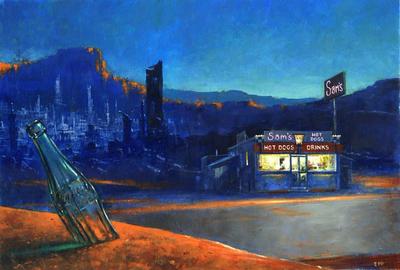“We’ll call the canal the Rockefeller Canal and the mountain King George Mountain and the sea the Dupont Sea, and there’ll be Roosevelt and Lincoln and Coolidge cities and it won’t ever be right, when there are the proper names for these places.”
– Ship Archaeologist Spender, in Ray Bradbury’s The Martian Chronicles
Looking through the “classics” section of the airport bookstore during my last trip, I found the above-quoted book. Luckily, as with the last couple holidays we’ve celebrated, it brings up thoughts that fit the current series. Not only are the Chronicles based on what American culture refers to as its “pioneer spirit,” but three of the stories appeared in magazines in the important year, 1948. Thirdly, although beautifully written – even (as Bradbury confesses) poetic – it is a fine example of the false dialogue we have been analyzing through this series.
One manifestation of the paucity of real dialogue here is that only Americans ever come to Mars – and, as far as I can tell, they are all culturally thoroughly “white.”
I should back up here and tell some of the plot. We start from the point of view of the Martians. Threatened for various reasons, they kill all the visitors on the first three Earth missions there. By the fourth mission, however, we learn that the Martians have been almost completely wiped out by chickenpox – a clear analogy to the fate of indigenous Americans (an analogy that is not lost on members of this group of invaders.) One of these members, quoted above, is deeply disturbed by the history of American imperialism, as well as the clear risk of nuclear war on Earth – and that there might soon be atomic weapons planted on Mars. This character, after observing the beauty of the emptied Martian cities and the crude disrespect of one of his fellow soldiers, kills some of them. His superior, Captain Wilder, although sympathetic, ends up killing him.*
Bradbury then describes the initial settlers as “the first Lonely Ones.” In the next chapter, a “Johnny Appleseed”-like character initiates “a private horticultural war with Mars,” replacing “plants so ancient they had worn themselves out” with Earth trees, making the air more hospitable to the newcomers. Later, some Catholic missionaries come to convert what Martians they can find. They find spherical lights that keep them from harm (even when they deliberately try to hurt themselves.) Convinced that this means Martians have souls that need to be saved, a priest, Father Peregrine, tries to discover how such aliens can sin. We discover that these Martians, the “Old Ones,” have forsaken their physical bodies and are thus “perfect.” I should note here that we do meet some, if very few, Martians who still have bodies – and that the story that features one of these beings emphasizes that they take the form of people whom the immigrants want to see.
Near the end, practically all the settlers unaccountably return to Earth when nuclear war begins there. We know of only three who remain behind: A miner who was away when the news of the war came; a chubby, unattractive young woman who stays behind because others made fun of her and made her ashamed of drinking chocolate malts; and a member of the fourth mission who, after his own family dies, makes convincing cybernetic copies of them.
In the last chapter a married couple (telling their three sons that they are going on vacation) take a “family rocket” to Mars – before the last Earth communication detectable from that planet ends. The boys’ father, a governor, burns all the documents he had taken from home and tells his children that there are enough people to “start over,” despite that only one other family might join them – another couple with three girls. Fiction had already been outlawed in America, and the immigrant who made the “last stand” for this art form made a grand gesture of killing the more prominent censors, destroying his own tribute to this art in the process. We get no sense that any more authors of fiction will arise (especially given how inbred the descendants of the survivors will be.) The book ends when, to answer his children’s query of when they can see Martians, their father brings them to a canal and has them look at their own reflections in the water.

Illustration for the chapter, “The Off Season”
*This is one of the stories published in 1948.